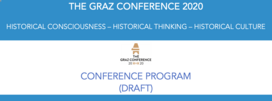VI – The core concepts of history didactics/historical education in relation to core concepts of theory of history
Interdisciplinary aspects have been taken into account by history didactics/historical education from the very beginning of its discourse, whether they came from philosophy, educational sciences, educational and/or pedagogical psychology, social psychology, sociology, communicative theories or cultural anthropology. The relationship between theory of history (Historik, Metahistory) and (theory of) history didactics was part of the initial debate on historical education and has given impulses to a series of subsequent models in history didactics/historical education.
However, up to nowadays, the relationship between theory of history and theory of history didactics/historical education remains opalescent and sometimes even enigmatic. Systematic comparison on the relationship between theory of history and theory of history didactics/ historical education might bring in additional impulses to the intercultural debate on the core concepts of historical education. Innovative impulses could be considered from e.g. the intercultural dimensions of core concepts in theory of history.
Questions of interest:
- How to understand, how to investigate and how to discuss ‘historical sense-making’, ‘historical consciousness’ or ‘historical thinking’ in their relation to theory of history in transnational perspective?
- Are there core concepts in theory of history which play a significant role in the development of theory of history didactics/historical learning (e.g. gender studies; cultural anthropology …)?
- What is the impact of the linguistic turn, the visual turn et al. on theory of history didactics/historical learning?
- How is the postmodernist discourse reflected in theory-building of history didactics/historical learning?
- What is the impact of theory building on controversial issues and diversity (such as race, gender, class, ethnicity, language) on concepts of ‘historical consciousness’, ‘historical thinking’ or ‘historical culture’?
- Is the discourse of postcolonial studies and on indigenous narratives reflected in theories of history didactics/ historical education?
- What might serve as an example of good practices for the relation between theory-building of history and theory-building of history didactics in the digital age/postmodern discourse?
Conference Office
Alois Ecker
Institute of History
Heinrichstraße 26/II
8010 Graz
Institute of History
Heinrichstraße 26/II
8010 Graz
Benjamin Ecker
Institute of History
Heinrichstraße 26/II
8010 Graz
CONFERENCE OFFICE
grazconference2020(at)uni-graz.at
+43 699 19221739
Bettina Paireder
Alois Ecker
Benjamin Ecker



